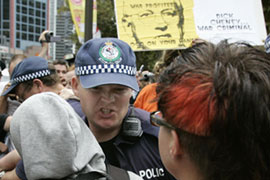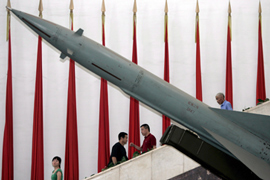Cheney concerned over China’s rise
Vice president praises role in N Korea deal, but worries over military build-up.

 |
| Cheney’s visit has been met with protests from opponents of the Iraq war [Reuters] |
The Australian government has been one of Washington’s closest allies in the Iraq war, but there has been growing opposition to the conflict in Australia.
 |
| The US has said China’s anti-satellite test risks sparking an arms race[EPA] |
He said North Korea’s missile tests, it’s nuclear test in October and its record of proliferation and human rights abuses did not put the North Korean government in a good light.
the North Korean people.”
Cheney arrived in Australia after talks in Japan where China‘s rise and growing military clout in the region was high on the agenda.
In his speech he said Australia and the US shared the same hopes for the future of China, namely: “that its people will enjoy greater freedom and prosperity: That its government will be a force for stability and peace in this region.”
‘Never wavered’
|
“The only option for our security and survival is to go on the offensive” Dick Cheney, |
On Saturday Cheney is scheduled to hold talks with John Howard, the Australian prime minister, focusing on Iraq and other security issues.
In his speech he said the US was grateful to Howard for his support, particularly in the war on terror.
“Prime Minister [John] Howard and the nation he serves has never wavered in the war on terror,” he said.
“The United States appreciates it and the whole world respects you for it.”
He said the US will not give up in Iraq and emphasised that the US-Australia security alliance has never been more important.
Timetable
“The only option for our security and survival is to go on the offensive, face the threat directly, patiently and systematically until the enemy is destroyed,” he added.
Howard is under growing pressure to set an exit plan for Australia‘s troops in and around Iraq, and has refused to set a timetable to withdraw saying it would enable terrorists to claim victory.
Instead, he has offered more troops for operations in both Iraq and Afghanistan.
On Wednesday, Britain and other allies announced a timed withdrawal of their security forces from Iraq, leaving Howard to explain why he was not doing the same.
Cheney and Howard are also expected to discuss David Hicks, an Australian captured in Afghanistan who has been locked up without trial at Guantanamo Bay for more than five years.